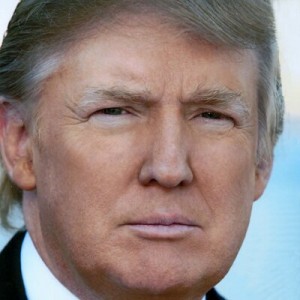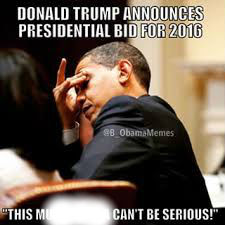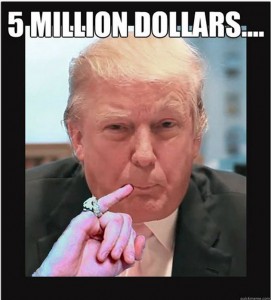Bever, Lindsey, and Abby Ohlheiser. “Baltimore Police: Freddie Gray Died from a ‘tragic Injury to His Spinal Cord’.” Washington Post. The Washington Post, 20 Apr. 2015. Web. 29 Jul 2015.
Dur, Jessica, and O. Network. “Donald Trump Slams ‘African American President’ on Baltimore Riots.” USA Today. Gannett, 28 Apr. 2015. Web. 29 Jul 2015.
Hilton, Perez. (@PerezHilton). “@realDonaldTrump That’s not even subtly #racist of you. It’s overtly racist and disgusting!” 28 Apr 2015, 3:15 p.m. Tweet.
“Policing Baltimore’s Police.” Baltimoresun.com. The Baltimore Sun, 4 May 2015. Web. 29 Jul 2015.
Somanader, Tanya. “President Obama on Freddie Gray’s Death: “This Is Not New, and We Shouldn’t Pretend That It’s New.”” The White House. The White House, 28 Apr. 2015. Web. 29 Jul 2015.
Trump, Donald (@realDonaldTrump). “Our great African American President hasn’t exactly had a positive impact on the thugs who are so happily and openly destroying Baltimore!” 27 Apr 2015, 9:38 p.m. Tweet.
Trump, Donald J. “Donald J. Trump: Biography.” Trump: The Trump Organization. The Trump Organization, 2015. Web. 29 Jul 2015.
 As a 2016 presidential candidate, international business owner, and joint title owner of The Miss Universe Organization, Donald Trump successfully created a name for himself economically in society (Trump 1). Recently, the media set its attention on the presidential race. One specific thing that has caught the media’s eye are the twitter posts made by Donald Trump over controversial topics and personal attacks towards others.
As a 2016 presidential candidate, international business owner, and joint title owner of The Miss Universe Organization, Donald Trump successfully created a name for himself economically in society (Trump 1). Recently, the media set its attention on the presidential race. One specific thing that has caught the media’s eye are the twitter posts made by Donald Trump over controversial topics and personal attacks towards others.
During the month of April, a young man by the name of Freddie Gray was pronounced dead a week after he was brutally acted upon by local police officers. In response to that incident, riots occurred that caused the city of Baltimore to undergo a strict set of temporary rules, like setting a city-wide curfew and having police in the streets to manage the riots (Bever 1). President Barack Obama, former law student at Harvard University and member of Illinois State Senate, also responded to this incident with how he planned to go about changing the police brutality issue in America (Somanader 1). After all of this occurred, Donald Trump resorted to Twitter sharing his views on Obama’s actions, regarding this issue.
Trump’s response to President Obama’s actions, regarding the police brutality issue and rioting in Baltimore, is not credible, because he addressed the president in a disrespectful way. He tweeted, “Our great African American President hasn’t exactly had a positive impact on the thugs who are so happily and openly destroying Baltimore!” (Trump). Trump could not possibly understand or relate to the “thugs’” lives and the environment that they live in everyday (Trump). As a multi-billionaire, Trump came from an affluent family of five and his parents could afford to send him to boarding school. Throughout his whole life, he has always been affluent and never had to worry about the problems that “thugs” in Baltimore face everyday (Trump).
 The sarcasm in “our great African American President” is very apparent and comes off as a racist notion from Trump (Trump). With his twitter post, he means to say, “If the president is so great, why did he not end the rioting and positively tried to impact that city, as opposed to allowing policemen to guard the area? Why did he allow the citizens, specifically people of color to ruin the city with riots?” Our President, Barack Obama, is indeed African American. Race should not have been a factor to bring up if one was to speak about this issue. Race has nothing to do with leadership effectiveness. One could be white, black, green, or blue and still be a great or even bad leader. Condoleezza Rice is an African American woman who was deemed one of “America’s Most Influential People” by Forbes because of her political and military related contributions to society promoting peace between many different nations. Sonia Sotomayor is the first Latina to be promoted to the Supreme Court. She impacted society through her votes on major issues in defining major laws in the Constitution. Her being a Puerto Rican and American has not affected her ability to serve as a Supreme Court Justice in our country. Our president has served two presidential terms, unlike Trump. Which shows that he knows exactly what he is doing and what he can and cannot do, regarding this issue. He also has so many issues that pull on him daily, so for Trump to call him out on this one issue when clearly Trump hasn’t done anything to reduce his issue, makes him look like a joke to others.
The sarcasm in “our great African American President” is very apparent and comes off as a racist notion from Trump (Trump). With his twitter post, he means to say, “If the president is so great, why did he not end the rioting and positively tried to impact that city, as opposed to allowing policemen to guard the area? Why did he allow the citizens, specifically people of color to ruin the city with riots?” Our President, Barack Obama, is indeed African American. Race should not have been a factor to bring up if one was to speak about this issue. Race has nothing to do with leadership effectiveness. One could be white, black, green, or blue and still be a great or even bad leader. Condoleezza Rice is an African American woman who was deemed one of “America’s Most Influential People” by Forbes because of her political and military related contributions to society promoting peace between many different nations. Sonia Sotomayor is the first Latina to be promoted to the Supreme Court. She impacted society through her votes on major issues in defining major laws in the Constitution. Her being a Puerto Rican and American has not affected her ability to serve as a Supreme Court Justice in our country. Our president has served two presidential terms, unlike Trump. Which shows that he knows exactly what he is doing and what he can and cannot do, regarding this issue. He also has so many issues that pull on him daily, so for Trump to call him out on this one issue when clearly Trump hasn’t done anything to reduce his issue, makes him look like a joke to others.
 Blogger and Television star, Perez Hilton, responded to Trump’s post, “@realDonaldTrump “That’s not even subtly #racist of you. It’s overtly racist and disgusting!” (Hilton). Hilton also is Caucasian, has been affluent all of his life, and can relate to Trump’s life, but his views on this tweet are different. Perez Hilton discrediting this post highlights the pure ignorance of Donald Trump’s tweet and discredits it, even more than it has discredited itself. Also, writing a tweet about a very sensitive issue, such as Baltimore riots and police brutality comes off as an immature move for a politician. Twitter generally has a younger, “hip” and “up-to-date” demographic compared to Facebook. This would be viewed as an amateur move, because typically young people use Twitter as an outlet for their problems. Donald Trump tweeting this would make society think that he is a young boy ranting ignorantly about an issue that doesn’t even relate to him. Donald Trump’s content and the place that he shared this content, regarding this Baltimore issue, is very inappropriate for a sixty nine year old politician who should be American’s role model.
Blogger and Television star, Perez Hilton, responded to Trump’s post, “@realDonaldTrump “That’s not even subtly #racist of you. It’s overtly racist and disgusting!” (Hilton). Hilton also is Caucasian, has been affluent all of his life, and can relate to Trump’s life, but his views on this tweet are different. Perez Hilton discrediting this post highlights the pure ignorance of Donald Trump’s tweet and discredits it, even more than it has discredited itself. Also, writing a tweet about a very sensitive issue, such as Baltimore riots and police brutality comes off as an immature move for a politician. Twitter generally has a younger, “hip” and “up-to-date” demographic compared to Facebook. This would be viewed as an amateur move, because typically young people use Twitter as an outlet for their problems. Donald Trump tweeting this would make society think that he is a young boy ranting ignorantly about an issue that doesn’t even relate to him. Donald Trump’s content and the place that he shared this content, regarding this Baltimore issue, is very inappropriate for a sixty nine year old politician who should be American’s role model.
Trump argues that “our African American President” did not do his job effectively (Trump). He should have contained these “thugs”  rioting in Baltimore and “positively” impacted the citizens, also known as “thugs”, in this community (Trump). Through other tweets, From a Republican standpoint, Trump argues that the highest taxpayers, high class citizens, are expected to rebuild the city destroyed by these “thugs” (Trump). He blames the law enforcement officials for allowing Baltimore riots to happen. He bashes the Mayor of Baltimore, Stephanie Rawlings-Blake, because she also allowed this rioting to happen as a retaliative cry for help.Trump also gives advice to President Obama to bring “both sides together” in Baltimore, basically calling for peace, in which he attempts to redirect the president of the United States on this issue (Trump). Donald Trump speaks for the affluent, potentially Caucasian, American who feels that Obama has not done enough on this issue and wishes that he would have contained the city better so that the wealthy elites don’t have to go out of their way to pay for the damage that is done.
rioting in Baltimore and “positively” impacted the citizens, also known as “thugs”, in this community (Trump). Through other tweets, From a Republican standpoint, Trump argues that the highest taxpayers, high class citizens, are expected to rebuild the city destroyed by these “thugs” (Trump). He blames the law enforcement officials for allowing Baltimore riots to happen. He bashes the Mayor of Baltimore, Stephanie Rawlings-Blake, because she also allowed this rioting to happen as a retaliative cry for help.Trump also gives advice to President Obama to bring “both sides together” in Baltimore, basically calling for peace, in which he attempts to redirect the president of the United States on this issue (Trump). Donald Trump speaks for the affluent, potentially Caucasian, American who feels that Obama has not done enough on this issue and wishes that he would have contained the city better so that the wealthy elites don’t have to go out of their way to pay for the damage that is done.
-RS3 written by Ashley Bedford
***Just for laughs.***




 The sarcasm in “our great African American President” is very apparent and comes off as a racist notion from Trump (Trump). With his twitter post, he means to say, “If the president is so great, why did he not end the rioting and positively tried to impact that city, as opposed to allowing policemen to guard the area? Why did he allow the citizens, specifically people of color to ruin the city with riots?” Our President, Barack Obama, is indeed African American. Race should not have been a factor to bring up if one was to speak about this issue. Race has nothing to do with leadership effectiveness. One could be white, black, green, or blue and still be a great or even bad leader. Condoleezza Rice is an African American woman who was deemed one of “America’s Most Influential People” by Forbes because of her political and military related contributions to society promoting peace between many different nations. Sonia Sotomayor is the first Latina to be promoted to the Supreme Court. She impacted society through her votes on major issues in defining major laws in the Constitution. Her being a Puerto Rican and American has not affected her ability to serve as a Supreme Court Justice in our country. Our president has served two presidential terms, unlike Trump. Which shows that he knows exactly what he is doing and what he can and cannot do, regarding this issue. He also has so many issues that pull on him daily, so for Trump to call him out on this one issue when clearly Trump hasn’t done anything to reduce his issue, makes him look like a joke to others.
The sarcasm in “our great African American President” is very apparent and comes off as a racist notion from Trump (Trump). With his twitter post, he means to say, “If the president is so great, why did he not end the rioting and positively tried to impact that city, as opposed to allowing policemen to guard the area? Why did he allow the citizens, specifically people of color to ruin the city with riots?” Our President, Barack Obama, is indeed African American. Race should not have been a factor to bring up if one was to speak about this issue. Race has nothing to do with leadership effectiveness. One could be white, black, green, or blue and still be a great or even bad leader. Condoleezza Rice is an African American woman who was deemed one of “America’s Most Influential People” by Forbes because of her political and military related contributions to society promoting peace between many different nations. Sonia Sotomayor is the first Latina to be promoted to the Supreme Court. She impacted society through her votes on major issues in defining major laws in the Constitution. Her being a Puerto Rican and American has not affected her ability to serve as a Supreme Court Justice in our country. Our president has served two presidential terms, unlike Trump. Which shows that he knows exactly what he is doing and what he can and cannot do, regarding this issue. He also has so many issues that pull on him daily, so for Trump to call him out on this one issue when clearly Trump hasn’t done anything to reduce his issue, makes him look like a joke to others. Blogger and Television star, Perez Hilton, responded to Trump’s post, “
Blogger and Television star, Perez Hilton, responded to Trump’s post, “ rioting in Baltimore and “positively” impacted the citizens, also known as “thugs”, in this community (Trump). Through other tweets, From a Republican standpoint, Trump argues that the highest taxpayers, high class citizens, are expected to rebuild the city destroyed by these “thugs” (Trump). He blames the law enforcement officials for allowing Baltimore riots to happen. He bashes the Mayor of Baltimore, Stephanie Rawlings-Blake, because she also allowed this rioting to happen as a retaliative cry for help.Trump also gives advice to President Obama to bring “both sides together” in Baltimore, basically calling for peace, in which he attempts to redirect the president of the United States on this issue (Trump). Donald Trump speaks for the affluent, potentially Caucasian, American who feels that Obama has not done enough on this issue and wishes that he would have contained the city better so that the wealthy elites don’t have to go out of their way to pay for the damage that is done.
rioting in Baltimore and “positively” impacted the citizens, also known as “thugs”, in this community (Trump). Through other tweets, From a Republican standpoint, Trump argues that the highest taxpayers, high class citizens, are expected to rebuild the city destroyed by these “thugs” (Trump). He blames the law enforcement officials for allowing Baltimore riots to happen. He bashes the Mayor of Baltimore, Stephanie Rawlings-Blake, because she also allowed this rioting to happen as a retaliative cry for help.Trump also gives advice to President Obama to bring “both sides together” in Baltimore, basically calling for peace, in which he attempts to redirect the president of the United States on this issue (Trump). Donald Trump speaks for the affluent, potentially Caucasian, American who feels that Obama has not done enough on this issue and wishes that he would have contained the city better so that the wealthy elites don’t have to go out of their way to pay for the damage that is done.
